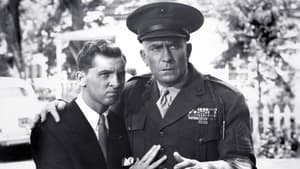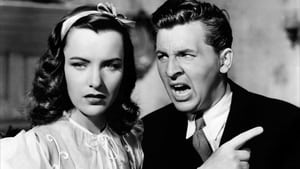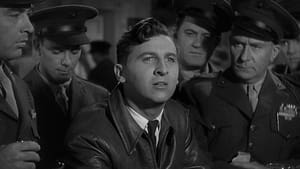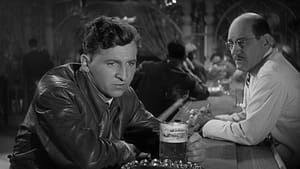Contact: info@alwanfilm.com
Video Sources 0 Views
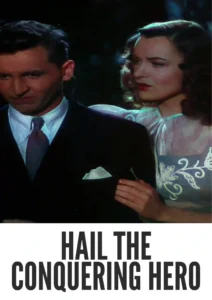
Synopsis
Hail the Conquering Hero 1944 Colorized Review: A Satirical Comedy of War and Honor

Introduction
Hail the Conquering Hero (1944), directed by the legendary Preston Sturges, stands out as a hallmark of American wartime cinema. This film, a sharp satire wrapped in a heartwarming comedy, delves into themes of heroism, honor, and the absurdities of war. Sturges’ impeccable direction, combined with a stellar cast, makes this film a timeless classic that continues to resonate with audiences today. In this review, we will explore the story, performances, and enduring impact of Hail the Conquering Hero, examining why it remains a significant work in the realm of comedic cinema and wartime storytelling.
Check The Full Colorized Movies List
Check Our Colorized Movies Trailer Channel
Understanding Hail the Conquering Hero 1944 Colorized: Director, Cast, and Genre
Director’s Vision
Preston Sturges, known for his witty and fast-paced dialogue, directed Hail the Conquering Hero at the height of his career. Sturges’ unique ability to blend satire with genuine emotion is evident throughout the film. He uses comedy not just to entertain, but also to critique societal norms and the glorification of wartime heroics. Sturges’ vision was to create a film that would resonate with audiences during World War II, offering both a critique of the myth-making surrounding war heroes and a comforting, humorous escape during difficult times.
Sturges was not just a director but also the writer of the film, and his signature style—marked by rapid-fire dialogue and a keen sense of irony—shines through every scene. His direction ensures that the film’s satirical elements never overshadow its heartfelt moments, striking a perfect balance that makes the story both touching and thought-provoking.
The Iconic Performance of Actors
The film features Eddie Bracken as Woodrow Lafayette Pershing Truesmith, a young man who becomes the unlikely hero of his small town. Bracken’s portrayal of Woodrow is endearing and sincere, capturing the character’s vulnerability, moral dilemma, and comedic misadventures with precision. Bracken’s performance anchors the film, making Woodrow’s journey from a shamed non-combatant to an accidental war hero both believable and deeply human.
William Demarest, another Sturges regular, delivers a standout performance as Sgt. Heppelfinger, the gruff yet kind-hearted Marine who helps orchestrate Woodrow’s transformation into a hometown hero. Demarest’s comedic timing and chemistry with Bracken add a dynamic layer to the film, providing much of its humor and heart.
The supporting cast, including Ella Raines as Libby, Woodrow’s love interest, and Franklin Pangborn as the flustered committee chairman, contribute significantly to the film’s comedic charm. Each actor brings a unique energy to their role, enriching the narrative and elevating the film’s overall impact.
Exploring the Genre
Hail the Conquering Hero is a satirical comedy that blends elements of screwball comedy with a deeper social commentary on heroism and military culture. Set against the backdrop of World War II, the film uses humor to explore serious themes, making it a rare gem in wartime cinema. It’s a classic example of how comedy can be used to address complex issues, making the audience laugh while simultaneously prompting them to reflect on the absurdity of societal expectations and the pressures of hero worship.
Exploring the World of Hail the Conquering Hero 1944 Colorized: Plot and Characters
Detailed Synopsis
Hail the Conquering Hero follows the story of Woodrow Truesmith, a young man who is discharged from the Marines due to chronic hay fever—a less-than-glorious reason that leaves him feeling disgraced and ashamed. Unable to face his patriotic small-town family and friends, Woodrow finds himself working in a factory, too embarrassed to return home.
Everything changes when Woodrow meets a group of battle-hardened Marines led by Sgt. Heppelfinger. After hearing Woodrow’s story, the Marines decide to help him regain his honor by concocting a plan: they dress him in a Marine uniform and accompany him back to his hometown, pretending he has just returned from the front lines as a war hero. What starts as a small lie quickly spirals out of control when the town’s residents, including his mother, shower him with praise, throw a massive parade, and even nominate him for mayor.
As the deception grows, Woodrow finds himself trapped between his desire to tell the truth and the overwhelming expectations of those around him. The film builds to a hilarious yet poignant climax as Woodrow must decide whether to continue living a lie or come clean and risk losing the town’s newfound admiration.
Complex Characters
The characters in Hail the Conquering Hero are richly developed, each contributing to the film’s satirical examination of heroism and small-town life. Woodrow Truesmith is a sympathetic protagonist whose personal conflict drives the narrative. His earnestness and honesty make his predicament all the more humorous, as he grapples with the moral implications of the Marines’ well-intentioned lie.
Sgt. Heppelfinger and his ragtag band of Marines serve as both Woodrow’s saviors and the comedic engine of the story. Their tough yet lovable personas and unwavering loyalty to Woodrow create a dynamic ensemble that enhances the film’s charm. The town’s residents, each exaggerated in their patriotism and naïveté, reflect the collective mood of 1940s America—a mixture of optimism, fervent support for the war effort, and an unyielding need to believe in heroes.
The Art of Film Satire
Understanding the Process
Satire in film is a delicate art, and Hail the Conquering Hero showcases Sturges at the peak of his satirical prowess. By employing humor to critique serious subjects, Sturges crafts a narrative that entertains while also provoking thought. The film’s satire is directed at the glorification of war heroes and the often unrealistic expectations placed on them by society. Through clever dialogue and situational comedy, Sturges exposes the absurdity of hero worship, especially when the “hero” himself is complicit in the deception.
Sturges’ satire doesn’t just mock; it also humanizes. He uses comedy to explore the emotional toll of false heroism on Woodrow, who is caught between his desire to be honest and his fear of disappointing those who look up to him. This nuanced approach elevates the film beyond simple comedy, making it a profound statement on the complexities of honor and reputation.
Early Satirical Comedies: A Brief History
Emergence of Satire in Cinema
Satirical comedies have been a staple of cinema since its early days, serving as a means to critique societal norms, politics, and human folly. In the 1930s and 1940s, satire gained prominence as filmmakers used humor to address serious subjects during turbulent times, including the Great Depression and World War II. Directors like Charlie Chaplin, Ernst Lubitsch, and Preston Sturges were pioneers in using satire to engage audiences while subtly challenging prevailing attitudes.
Films like The Great Dictator (1940) and To Be or Not to Be (1942) used satire to confront fascism and war, blending humor with biting social commentary. Hail the Conquering Hero fits neatly into this tradition, offering a comedic yet critical look at American values during wartime.
Hail the Conquering Hero 1944 and Its Impact on Wartime Cinema
The Satirical Lens on War
Hail the Conquering Hero was released during World War II, a time when audiences were inundated with patriotic films that glorified military service. Sturges’ film stood out for its willingness to poke fun at the idealization of war heroes, offering a counter-narrative that resonated with audiences who were all too familiar with the pressures of wartime propaganda.
The film’s impact lies in its ability to entertain while challenging the societal norms of the time. By presenting a protagonist who is not a conventional hero, Sturges subverts the typical wartime narrative, reminding audiences that heroism comes in many forms, and that the pressures of societal expectations can be as daunting as any battlefield.
The Debate Over Heroism in Cinema
Hero Worship vs. Realism
Hail the Conquering Hero plays with the concept of heroism, contrasting the public’s need for heroic figures with the often less glamorous reality of individuals who are thrust into these roles. The film suggests that society’s hunger for heroes can lead to unrealistic expectations, forcing individuals into situations that compromise their integrity. This debate over the portrayal of heroism in cinema remains relevant today, as audiences continue to grapple with the difference between on-screen portrayals and real-life complexities.
Sturges’ film is particularly poignant in its critique of how communities project their hopes and fears onto their supposed heroes. Woodrow’s reluctant acceptance of the hero mantle is a reflection of the burdens placed on individuals who, willingly or unwillingly, become symbols of something greater than themselves.
Examining Hail the Conquering Hero 1944 Colorized as a Satirical Masterpiece
Balancing Humor and Heart
Sturges’ genius lies in his ability to balance the film’s humorous elements with genuine emotional depth. Hail the Conquering Hero is not just a comedy; it is a heartfelt exploration of personal struggle, societal pressure, and the fine line between truth and fiction. The film’s humor serves to underscore the absurdity of Woodrow’s predicament, while its emotional moments highlight the human cost of living up to other people’s expectations.
This balance makes Hail the Conquering Hero a standout in the genre of satirical comedies, as it manages to be both laugh-out-loud funny and deeply moving. Sturges’ direction ensures that the film’s message is never heavy-handed, allowing the audience to engage with the story on multiple levels.
Influence and Legacy: Hail the Conquering Hero 1944 Colorized’s Impact on Cinema
Preston Sturges’ Enduring Legacy
Hail the Conquering Hero cemented Preston Sturges’ status as one of Hollywood’s most innovative directors. The film’s blend of satire, humor, and heartfelt storytelling influenced future generations of filmmakers who sought to use comedy as a vehicle for social commentary. Sturges’ work, including Hail the Conquering Hero, paved the way for directors like Billy Wilder, Woody Allen, and the Coen Brothers, who have continued to explore the intersection of humor and social critique in their films.
A Timeless Message
The film’s message about the complexities of heroism and the dangers of false narratives remains relevant today. In an era of media saturation and public scrutiny, the themes explored in Hail the Conquering Hero continue to resonate, reminding audiences of the human stories behind the headlines.
Themes Explored in Hail the Conquering Hero 1944 Colorized
Honor, Integrity, and the Absurdity of Heroism
Hail the Conquering Hero delves into themes of honor and integrity, questioning what it truly means to be a hero. Woodrow’s internal conflict between maintaining the facade of heroism and staying true to his values is a central theme that drives the narrative. The film also touches on the absurdity of societal expectations, highlighting how communities often construct their own versions of reality to suit their needs.
The Power of Community and Forgiveness
At its core, the film is also about the power of community and the importance of forgiveness—both of oneself and of others. Woodrow’s journey is one of self-acceptance, and the town’s eventual embrace of him, despite the revelation of the truth, speaks to the enduring bonds of family, friendship, and hometown loyalty.
Reception and Controversy Surrounding Hail the Conquering Hero 1944 Colorized
Initial Reviews and Audience Reactions
Upon its release, Hail the Conquering Hero received critical acclaim for its sharp wit and poignant commentary. Audiences appreciated the film’s humor and its subversive take on wartime heroism. However, the film’s satirical approach also drew some criticism, with a few detractors arguing that its humor undermined the seriousness of the war effort. Nevertheless, the film’s popularity has endured, and it is now celebrated as a classic of American cinema.
Where to Watch Hail the Conquering Hero 1944 Colorized Online
For those eager to watch Hail the Conquering Hero (1944), the film is available on various streaming platforms such as Amazon Prime Video, Criterion Channel, and Turner Classic Movies. DVD and Blu-ray editions are also widely available for those who wish to own a piece of this cinematic treasure.
FAQs About Hail the Conquering Hero 1944 Colorized
Q: What makes Hail the Conquering Hero a standout film?
A: The film’s unique blend of comedy, satire, and heartfelt storytelling sets it apart, offering both entertainment and a thoughtful critique of heroism.
Q: Who directed Hail the Conquering Hero?
A: The film was directed by Preston Sturges, one of Hollywood’s most celebrated writer-directors of the 1940s.
Q: What themes are explored in the film?
A: The film explores themes of honor, integrity, societal expectations, and the complexities of heroism, all wrapped in a comedic narrative.
Q: Is Hail the Conquering Hero based on a true story?
A: No, the film is a fictional work, though it draws on the real emotions and societal pressures of wartime America.
Conclusion
Hail the Conquering Hero (1944) remains a masterclass in satirical filmmaking, offering a sharp critique of hero worship wrapped in a delightful comedic package. Preston Sturges’ direction and Eddie Bracken’s endearing performance make this film a timeless exploration of human nature, honor, and the power of truth. As relevant today as it was in the 1940s, Hail the Conquering Hero invites audiences to laugh, reflect, and ultimately recognize the value of authenticity in a world often obsessed with image.
